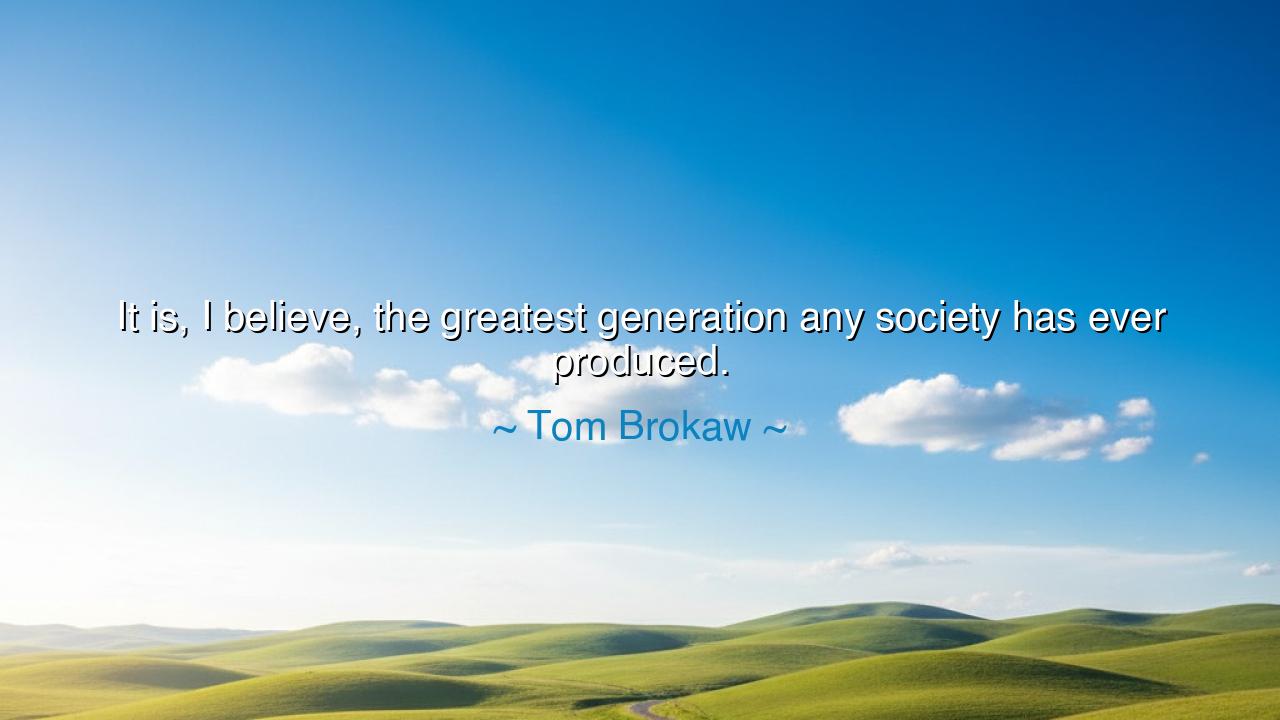
It is, I believe, the greatest generation any society has ever






Hear the voice of Tom Brokaw, who, gazing upon the deeds of those who lived before us, declared: “It is, I believe, the greatest generation any society has ever produced.” These words, carved in reverence, were spoken of those who came of age in the fires of the Great Depression and were forged into steel by the trials of the Second World War. They were not called “great” because they sought glory, but because they endured hardship, carried duty upon their backs, and built a world where hope could rise again from ashes.
The greatest generation was born in scarcity, raised in uncertainty, and tested by catastrophe. As children, they learned the language of sacrifice when bread was scarce and work was hard to find. As young men and women, they were summoned across oceans to confront tyranny on battlefields drenched in blood. They stormed beaches, fought in forests, crossed deserts, and endured prison camps. Yet, when the fires of war were extinguished, they did not seek only to rest; they returned to rebuild, to labor, to raise families, and to lay the foundations of prosperity for those who would follow.
Consider the tale of Normandy, June 6, 1944. The world watched as young soldiers—farm boys, factory workers, sons of immigrants—leapt from boats into the maw of death. Many never rose from that shore, but their sacrifice cracked the fortress of tyranny. Those who lived bore scars, both seen and unseen, but did not cling to bitterness. Instead, they returned home with quiet resolve, shaping towns, schools, and institutions that would nurture generations unborn. Their heroism was not in victory alone, but in their refusal to abandon duty, even when fear consumed them.
Brokaw’s words are not simply about soldiers, but about an entire society united by resilience. The women who worked the factories in place of men, the families who rationed and saved, the communities who rebuilt shattered cities—all stood together. Their greatness was not found in individual triumph, but in collective endurance. They believed in something larger than themselves, and in so doing, they lifted the world.
The meaning of this quote reaches beyond history: it is a reminder that true greatness arises not in comfort, but in adversity. A generation is not measured by its wealth or its ease, but by its response to hardship. The greatest generation teaches us that when trials come, they can either break us or refine us. When faced with despair, they chose courage. When confronted with ruin, they chose creation. And in this choice, they revealed what a people can become when united by sacrifice and purpose.
Let us draw the lesson: every age carries its own trials, though they may not mirror the world wars or the Great Depression. In our time, we face different storms—pandemics, divisions, economic uncertainty, the challenge of preserving our planet. These too demand courage, endurance, and unity. If we remember the example of the greatest generation, we will see that greatness is always possible, but it is purchased with effort, sacrifice, and love of the common good.
Therefore, O seeker, do not long only for comfort. Instead, when hardship comes, stand firm. When others despair, lift them. When society falters, become one who rebuilds. Teach your children not only the victories of the past, but the character that made them possible: resilience, duty, sacrifice, and hope. For in living so, we honor the greatest generation, and perhaps in our trials, a new greatness may yet be born.
Thus, let the words of Tom Brokaw endure: “It is, I believe, the greatest generation any society has ever produced.” Not because they were flawless, nor because they lived without suffering, but because they answered suffering with courage and transformed duty into triumph. This is the torch they pass to us—and it is ours to carry forward, lest we let their greatness fade into memory rather than into living example.






AAdministratorAdministrator
Welcome, honored guests. Please leave a comment, we will respond soon